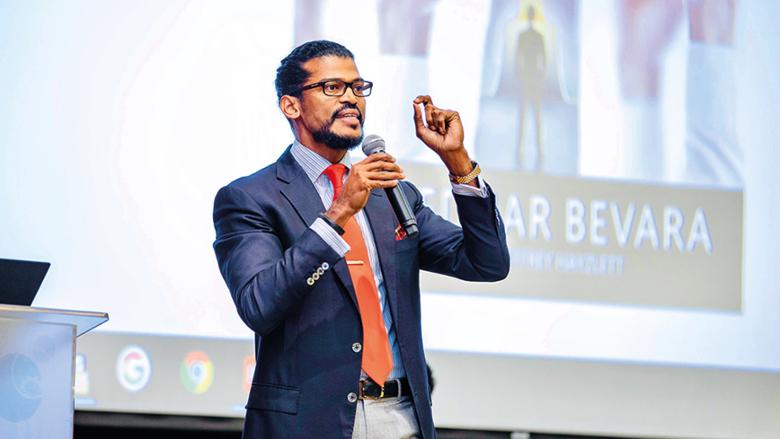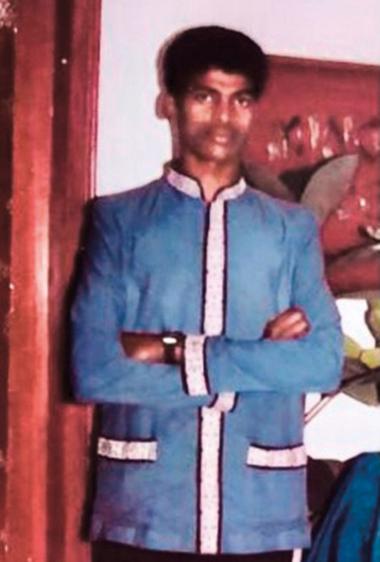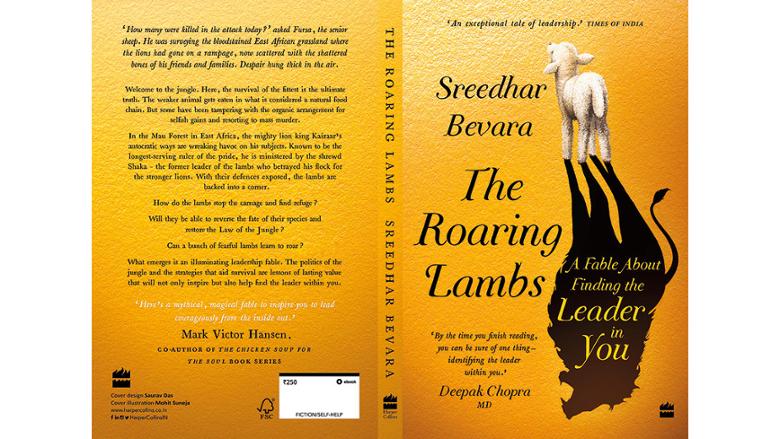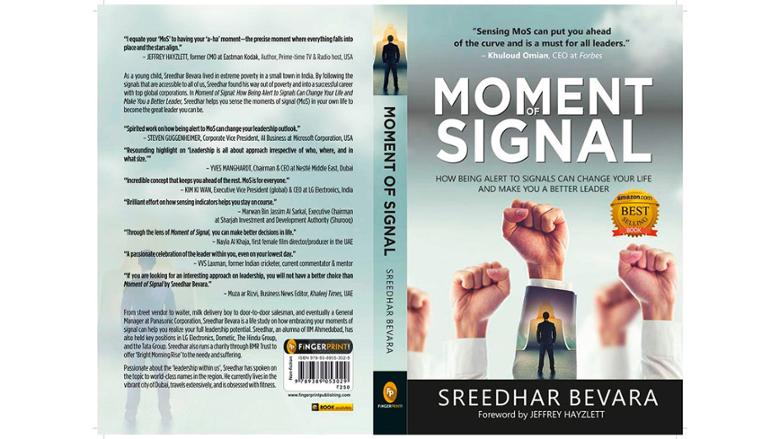Sreedhar Bevara: ‘To survive, you need to live in the moment’
Motivational speaker, bestselling author, thought leader and strategic management consultant, Sreedhar Bevara tells Anand Raj OK why he believes a wild dog has better survival skills than a lion, what makes a great leader and what one needs to keep in mind to succeed
Of all the pointers for business and personal success that bestselling business book author Sreedhar Bevara has written about – and trust me, there are quite a few – one that remains right on top of my mind has to do with lions and wild dogs. While there are any number of tales and fables that underscore the lion’s invincibility, bravery and ability to lord over other animals through its sheer strength and daring, Sreedhar believes wild dogs fare far better than the king of the jungle when it comes to hunting.
"Their [the wild dogs’] success rate when it comes to hunting is more than 80 per cent; far greater than the 30 per cent of lions’," says the motivational speaker and one of the fastest rising thought leaders from India.
Size, he believes, doesn’t matter. What does is coordination. "And when it comes to coordination and kill’s success rate, wild dogs almost never have to sleep hungry," says the IIM Ahmedabad alumnus. "They can fight against a pack that’s far larger than they are, and their ability to coordinate among groups is phenomenal. And very interestingly, they let the pups eat first unlike the lion who takes the first bite of a kill."
The badshah of business-speak admits that while a lion might be able to stalk its prey and even face off with an opponent far larger and more dangerous than itself, where wild dogs score is in their ability to ‘communicate’ well within a group. "That’s phenomenal; they act like a real team. The point is irrespective of the size of the team, communication needs to align forces into one cohesive power for success."
Juxtapose what Sreedhar says into a business setting and the penny drops.
The former senior general manager of a Fortune 500 company in Dubai also has an interesting take on how start-ups can garner valuable lessons from a duel between a mongoose and a snake, but about that later.
First a little about the man behind such popular bestselling business books as The Roaring Lambs and Moment of Signal, and who has received appreciation from the likes of the vice-president of India Venkaiah Naidu, wellness expert and author Dr Deepak Chopra, Pursuit of Happyness author Chris Gardner, and founder and co-creator of the Chicken Soup for the Soul book series Mark Victor Hansen.
The CEO of BMR Innovations, a global management and technology consulting firm with offices in the UAE, India and the USA, Sreedhar came up in life the hard way.
Until barely two decades ago, the resident of Vantaram in Vizianagaram district of Andhra Pradesh worked as a milk delivery person and at a poultry store to help supplement the income of his family that included his parents and three siblings. With his father unable to support them, the onus fell on his elder brother Muralidhar Rao to take care of the family. "It was my brother who taught me the value of hard work and the need to have a vision to come up in life. Sadly, my brother succumbed to cancer a few years ago."
To help make ends meet, Sreedhar, while studying privately for an undergraduate degree in commerce, also worked as a waiter at the Taj group’s Gateway Hotel in Visakhapatnam.
"Those were days when every meal mattered," says the head of BMR, a firm that offers strategic management consultancy to corporations, governments and other organizations to help maximise their business potential. (BMR’s clients include AppOrchid, a Nasdaq listed company in North America and Hatti Kaapi, a popular coffee chain based out of Bengaluru.)
Working as a waiter taught him several valuable life lessons including being patient, managing tricky situations that can arise at the drop of a soup bowl and learning the fine art of treating people – guests and colleagues – well.

"Challenges and hardships due to traumatic experiences of poverty can either make you or break you," he says. "During those struggling times, my only thought was to make a mark in life and grow in my field."
And grow he did. After earning a Master’s in business management, he took up a job in a leading Indian newspaper as its distribution manager in a district in Andhra Pradesh. The next rung up the corporate ladder was when he landed a plum job as senior general manager with an MNC in Dubai.
"Passion to excel while constantly demonstrating a collaborative approach has helped me immensely to survive and this is the central theme of my previous bestseller Moment of Signal. If one can use that approach in the right direction a plethora of opportunities will keep popping up," says the author who contributes to Forbes and is a regular speaker at IIMs, IITs and universities such as AUS in Sharjah and Stenden University in Qatar.
Sreedhar’s book Moment of Signal has several pointers for those seeking to make the most of opportunities that come their way. But how does one recognise an opportunity when it presents itself? What are the signals one needs to look out for?
"Staying alert to what is going to come is crucial," says Sreedhar. For this to happen you need to stay relevant and up to date. "Quite literally you need to be living in the moment," he says. For instance, if a person is surprised to find that one day his position in his office has been made redundant, it only proves that he was not being alert to the signals or signs in his work environment.
What has the pandemic taught us? I ask.
"To expect the unexpected," he says. Humankind has survived worse tragedies. Adaptability is a unique quality of humankind. This period has been a great opportunity for many to reinvent, reshape and refocus their life both personally and professionally, he feels, while underscoring the importance of staying alert to not only come to terms with and to overcome challenges but to be able to move swiftly and "respond in a manner that will help you".

Responding correctly and taking action at the right time are factors that mark a great leader, he says, and helping people become great leaders is the focus of the leadership expert’s bestseller The Roaring Lambs.
In the jungle, survival of the fittest is the ultimate truth, he writes. Those with power rule, while those who are weak die. But what if those in power tamper with this organic arrangement for selfish gains? How can the weak fight against the strong and the selfish to restore the law of the jungle?
"People," he says, "will support you when your passion towards a vision that aims for greatness is explicitly demonstrated." In this context, greatness is not about an individual, the business coach makes it clear. "It is about the objective that can facilitate or help people now and in the future to live better."
So, what five qualities mark an excellent leader?
Clarity, attentiveness, delegation, appreciation and grace. He expands on each:
Clarity is crucial in any form of communication— be it in the things they think, say, write or do. Ambiguity has no place in their system. Precise in their approach, their communication is extraordinarily simple. But to be clear and decisive, they first need to be adept at listening and imbibing the environment. Great leaders are transparent, and their progress is often defined by their decisiveness. They invest their time in talking to their people, communicating regularly, addressing concerns with clarity, providing guidance, but above all, being great listeners- the last an art very few possess, he says.
Attentiveness: Take a look at animals in their natural setting and you will realise that they are instinctively tuned to be attentive to their surroundings. They need to be that way to stay alive and thrive. They have an extraordinary ability to sense signals and plan accordingly. Great leaders, too, need to keep abreast of changes to stay one step ahead of the game. They also are attentive to their intuition, to new ideas, details, and to their people’s needs. For a leader to make a decision that will ensure success, they must pay attention to the signals that show up throughout the day. Being attentive is the most common yet significant trait.
Delegation: The first step before empowerment. Even ‘super’ leaders need help and support, which is best achieved by effective delegation. This helps a leader to not only free up time to focus on bigger things but also provides a learning and development opportunity for team members. Delegating also demonstrates an element of trust. People want to be trusted and will feel a sense of self-worth and pride. When people are able to contribute to the business, they feel like they are adding value— it builds employee morale. Remember, the success of an organization is built through trust.
Appreciation: A key element that restores faith in the minds of people, it helps boost the self-confidence of a team member. Gratitude is a genuine and powerful tool that not only encourages people to take more calculated risks with an accountable approach, but is also beneficial to the organization as it triggers a chain effect of positivism. Good leaders can blend appreciation with constructive feedback; that will invariably help unlock the potential of members which dovetails nice to the ultimate goal— to optimize the power of talent.
Grace: One of the most important features of great leaders, it sets them apart from almost everyone. Grace is not just in what they wear, how they carry themselves and the way they deliver their message, but also in the way they conduct themselves in the toughest and most excruciating circumstances. Grace does not imply weakness. The strength of a leader does not lie in their ability to be aggressive, intimidating or humiliating towards their subordinates. Fear, says sreedhar, though it may look effective, doesn’t cultivate creativity and where there is no creativity, there’s no effort or hard work. Grace incidentally is measured only in tough times, never in comfort.
As we approach the end of the interview I ask Sreedhar to expand on an interesting section in his book where he suggests how start-ups can take lessons from the manner in which a mongoose duels with a snake.
The mongoose, says the motivational speaker, is not the strongest when pitted against a snake. But where it scores over the reptile is in its agility and swiftness. "The mongoose makes sustained swift, lateral movements which can tire a snake. The animal’s dart and feint movements make the reptile respond repeatedly, eventually leaving it exhausted giving the mongoose the upper hand.
"Start-ups should recognise their strengths and then build on them. And importantly don’t give up easily. A start up should also be knowledgeable about the competition and recognise how to tackle it sensibly."

At the end of it all, start-up firm or even one well-entrenched in the market, to stay in the race it needs to be on its feet and never pause to rest or be complacent, he makes it clear.
He recounts the oft-quoted tale at motivational seminars and business pep talk sessions. "Every morning in Africa, a gazelle wakes up knowing it must outrun the fastest lion, or end up being the king of the jungle’s lunch. Every morning in Africa, a lion wakes up knowing it must run faster than the slowest gazelle, or it will starve.
"It doesn’t matter whether you are the lion or a gazelle- when the sun comes up, you’d better be running to survive," he says.
Tips to be a good team leader
Passion: Passion goes hand in glove with strong self-belief. It is flamed by a desire to do things and do them exceptionally well. When people are passionate about the things they do, the outcome will very likely be successful.
Passion is often supported by the flair to do things despite the challenges and hurdles that are not only visible but also potential enough to threaten the existence and progress of the greater vision.
Openness: A good leader is open-minded to both constructive criticism and opposing views. They agree to disagree, and make their people feel at ease to take an active part when invited. They gain trust through building relationships and most of the time, people want to follow this type of a leader.
Ultimately people want to feel important, and when their leader takes an interest in them, people are more likely to stay and put forward their best work.
Trust is a driving force for people to invest their time and energies in an organization. Without trust, there is simply nothing. The same is true both in our personal and professional lives.
Flexibility: You cannot get meaningful results if you are fixed in your mindset, approach, and expectations. Great leaders are open to new ways of doing business and are flexible in their approach. In any team, people come with different strengths, backgrounds, educational levels, work styles, and above all, different emotional intelligence levels.
Ease: Ease is mostly reflected in communication, process, decision-making, or basic values. When these are strong, transparency increases, and thus, the trust factor among members flourishes, which results in the total environment turning into a cohesive unit.
A simplified approach methodology is one of most revered approaches, but it is also very rare to find.

